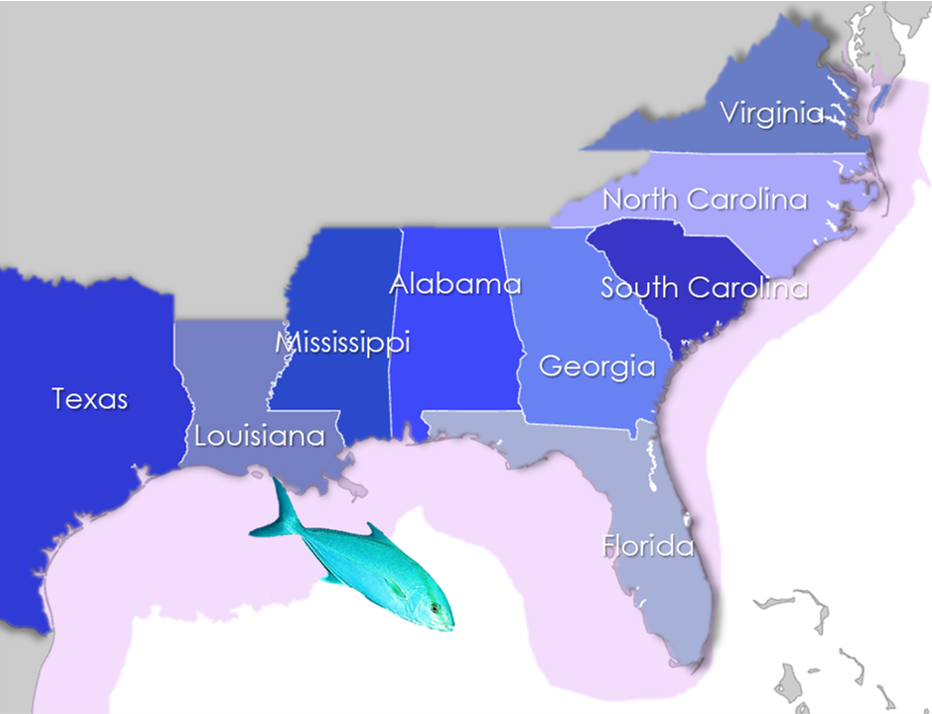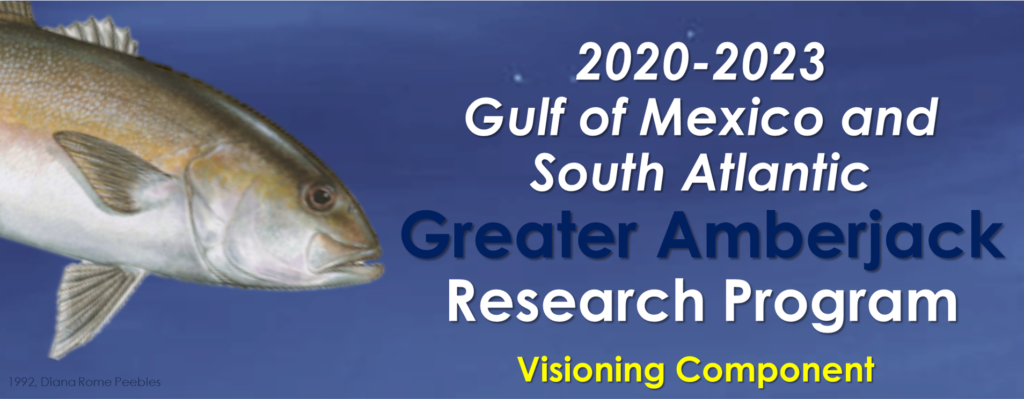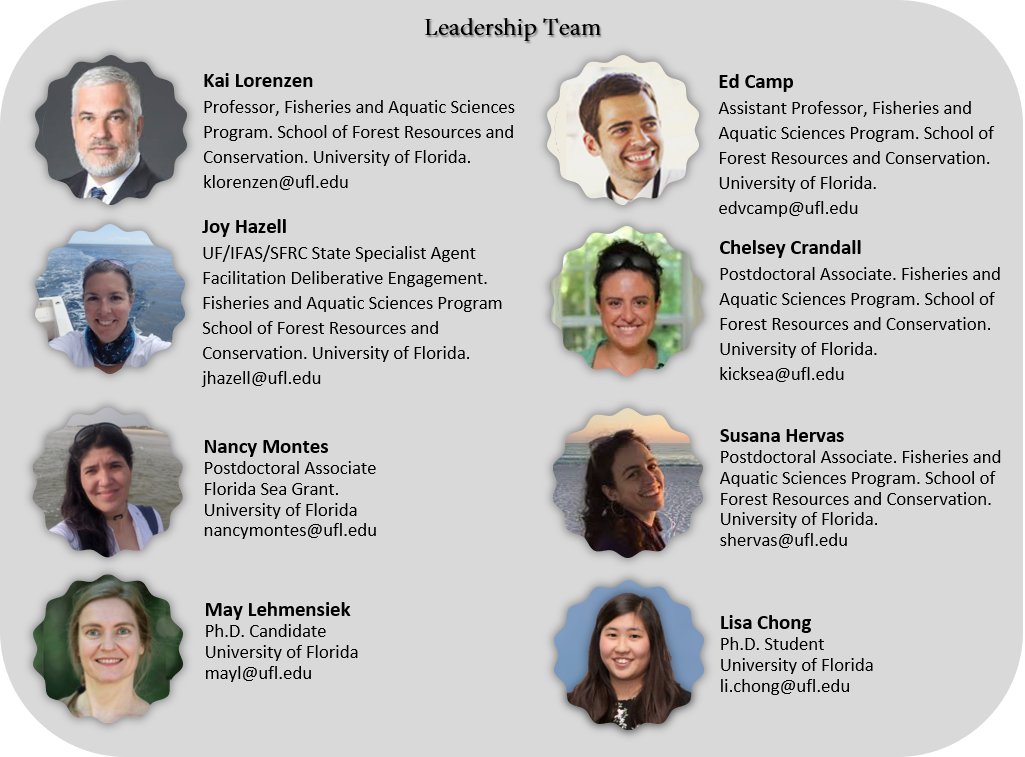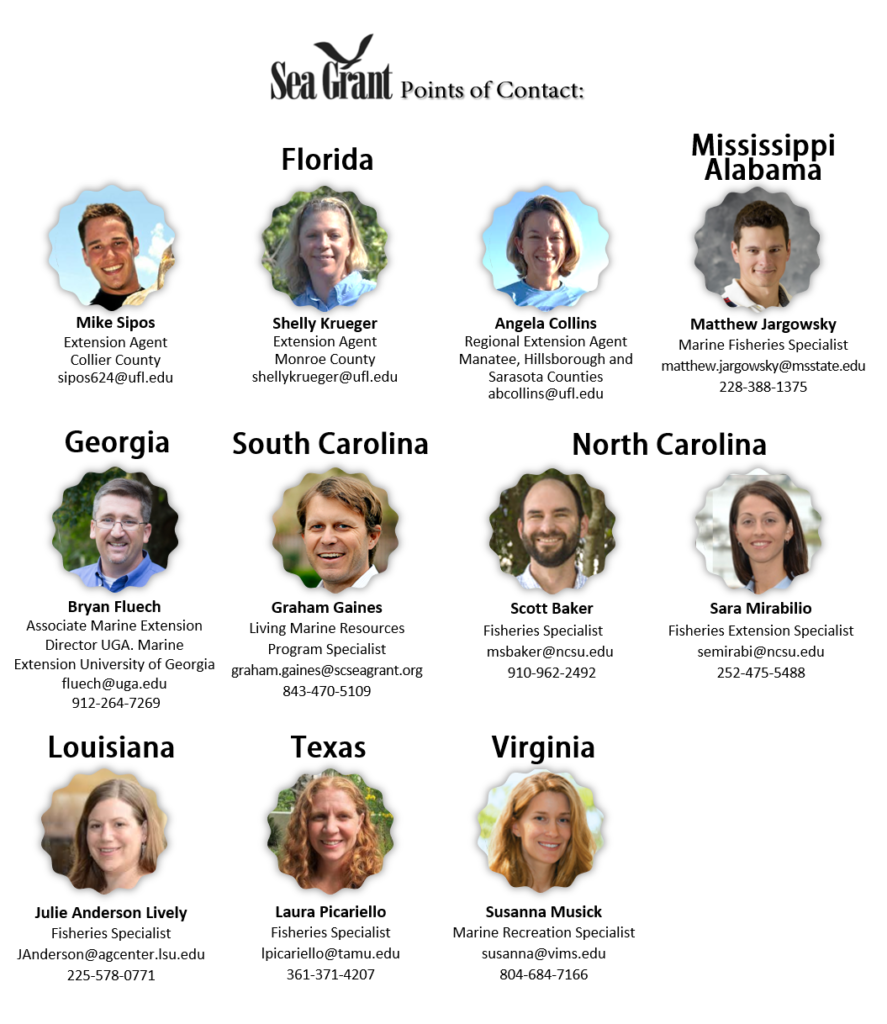The Greater Amberjack (Seriola dumerili) is an important recreational and commercial fish species in the Gulf of Mexico (GOMEX) and South Atlantic (SA) regions. To address management and stakeholder concerns about the greater amberjack fisheries in both regions, Congress authorized funding of $ 10 Million for a multi-year Greater Amberjack Research Program to be implemented through a cooperative agreement with the National Sea Grant Office (NSGO) and the National Marine Fisheries Service (NMFS).
Research Program Goal

The goal of this research program is to develop additional data sources, assessment approaches, and knowledge to improve agency and agency independent estimates of the abundance of Greater Amberjack throughout the Greater Amberjack’s range.
Approach
The project consists of three phases in which a steering committee will provide overall guidance.
 The Visioning Phase will focus on developing a set of research recommendations for the program, based on existing information and consultation of stakeholders and independent experts. Research recommendations developed in the visioning phase will be considered by the steering committee in their development of the Request for Proposals (RFP).
The Visioning Phase will focus on developing a set of research recommendations for the program, based on existing information and consultation of stakeholders and independent experts. Research recommendations developed in the visioning phase will be considered by the steering committee in their development of the Request for Proposals (RFP).
The Implementing Phase will consist of (1) finalizing, releasing, and advertising the (RFP) (2) evaluating and selecting the fundable proposals, and (3) implementing the research projects that address the priorities. For more information about this component please visit http://masgc.org/greater-amberjack/about
The Documenting Phase will summarize the results of research funded by this project to facilitate the transfer of new knowledge derived from the research to stakeholders involved in the stock assessment process.
Visioning Process
The aim of the visioning process is to develop a set of research recommendations to be considered for the implementation phase of the program. The visioning process entails:
(1) reviewing existing information from stock assessments, management reports, and the scientific literature;
(2) conducting a situation analysis based on stakeholder input;
(3) identifying a draft set of research recommendations;
(4) obtaining stakeholder feedback on the draft research recommendations through regional listening sessions; and
(5) obtaining technical feedback on the draft research recommendations from a panel of independent experts.

Stakeholders are invited to give input to the situation analysis in September-October 2020, and to provide feedback on the draft research recommendations during listening sessions planned for late November-December. During the situation analysis, we are looking for broad input to help us understand how stakeholders view the greater amberjack fishery, its management, and the science used in management. If you’d like to share your views and knowledge for the situation analysis, please reach out to the point of contact in your Sea Grant program (see below) or to Nancy Montes at Florida Sea Grant. Details on how to provide feedback on draft recommendations at the subsequent listening sessions will be posted in due course.
Visioning Team
Outcome of Visioning Process
There were five phases of the visioning session. First, a situation analysis was implemented to understand how stakeholders viewed the GAJ fishery/management/research; 89 stakeholders participated, the majority being fishermen, followed by researchers, and managers. 60% of stakeholders operated in the GOM and 40% operated in the SA. During the situation analysis, stakeholders identified GAJ as a fishery of moderate but increasing importance, with charter fishermen having a particular interest due to GAJ’s fighting abilities. There has been an observed long term decline in the fishery and there were concerns over increased fishing pressure (especially with the increase in artificial reefs, concentrating GAJ and increasing their vulnerability to overfishing). Stakeholders also believed that there were significant regional differences in GAJ abundance that weren’t accounted for in regulations, rendering them less effective.
The results were then combined with a review of existing GAJ literature to produce an initial draft of research recommendations. A series of regional listening sessions followed to refine these recommendations. 50 participants attended five listening session meetings, with the majority (74%) being from research or management backgrounds. The majority of participants operated in the GOM (52%) while 36% were SA (the remainder indicated both). The listening sessions contributed multiple specific recommendations, including: the implementation of eDNA, acoustic, and tagging programs to respond to historic issues identifying GAJ in surveys; encouraging synergy with existing efforts to leverage resources; and producing multiple smaller projects to address specific stakeholder concerns such as discard mortality and identifying spawning aggregations.
The outcome of the visioning sessions was a set of prioritized research needs for consideration in the GAJ research program’s Request for Proposals (RFP), which is linked in the following section. The majority of recommendations were reflected in the RFP, including collecting GAJ across spatial and size ranges to provide estimates of age, sexual maturity, and stock connectivity, creating studies with specific repeatability in other parts of the GAJ range, and collaborating with fishermen to leverage resources and promote communication. The outcomes of the visioning session were important in directing research of GAJ stocks using the diverse knowledge of stakeholders in the GOMEX and SA and deepening connections between managers, researchers, and fishermen. The results of the visioning session and subsequent research are planned to be shared with stakeholders at a GAJ Research Visioning Insights Workshop scheduled for August 2022.
Research Recommendations
To obtain a copy of the draft of the greater amberjack research recommendations produced during the visioning phase of the program please CLICK HERE.
To obtain more information about the current status (implementation phase) of the program please contact Mississippi-Alabama Sea Grant Consortium or visit http://masgc.org/greater-amberjack/about.
Questions?
Please direct any questions regarding the VISIONING PHASE to your Sea Grant program’s point of contact or to Florida Sea Grant c/o Dr. Nancy Montes at nancymontes@ufl.edu



